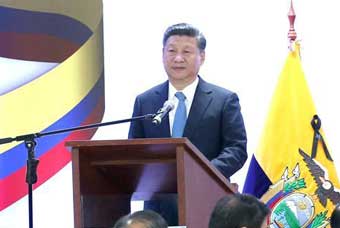MEXICO CITY, Dec. 29 (Xinhua) -- The Merida Initiative, a major instrument of cooperation between Mexico and the United States against drug trafficking, may be dismantled or made irrelevant by the upcoming U.S. administration of Donald Trump, experts warned.
Security analyst Alejandro Hope predicted that the Trump presidency would end the bilateral agreement, which was signed into law in 2008, seeking to strengthen Mexican security institutions and thwart cartels on both sides of the border.
"The Merida Initiative will be over. I believe that, with nothing to replace it as we have seen no proposals for that, we will see a break in institutional relations for security matters," the expert told Xinhua.
Since being agreed upon by former U.S. President George W. Bush and former Mexican President Felipe Calderon, the two countries have taken a mutually responsible approach to fighting drug traffickers. From 2008 to 2015, Congress also granted around 2.5 billion U.S. dollars in cash, equipment, training and technology to Mexico as part of the deal.
David Crow, a professor of international studies at Mexico's CIDE, a higher education institution focusing on economic research, said: "I see absolutely no sign that this work will continue under the Trump administration."
For Crow, the initiative will remain inert during the initial months of Trump's mandate before potentially being gutted down the line as a way to save resources being spent by Congress.
"The only hope is that, given the broad panorama of relations and interests the U.S. has around the world, this goes unnoticed for a while," added the researcher.
Trump's plans concerning cross-border drug trafficking have not been detailed, as he has mainly focused on building a wall along the more than 3,200-km border between the two countries.
For Hope, the high cost of building the wall, estimated at around 26 billion dollars, could be an excuse for Trump to ask Congress to block resources from going to the Merida Initiative.
Should these fears prove true, bilateral security cooperation would regress to inter-agency relations, which largely depend on friendship between officials, Hope believes.
This would certainly reduce the level of bilateral cooperation reached in recent years, including the capturing of senior cartel leaders.
Furthermore, Hope foresees that a security crackdown along the border, as promised by Trump, could result in growing violence among cartels to control dwindling access routes.
For Paulina Arriaga, founder of the citizen initiative Desarma Mexico (Disarm Mexico), the Mexican government must also crack down on weapons entering the country from the United States and fomenting gang violence.
Arriaga told Xinhua that at least 70 percent of guns taken from criminal groups in Mexico in recent years came from the United States.
"The efforts the U.S. is making to stop migrants cannot be compared to the efforts being made to stop weapons smuggling. If it is in their interests to stop migrants from crossing, it should be in our interest to stop weapons smuggling," she concluded.










